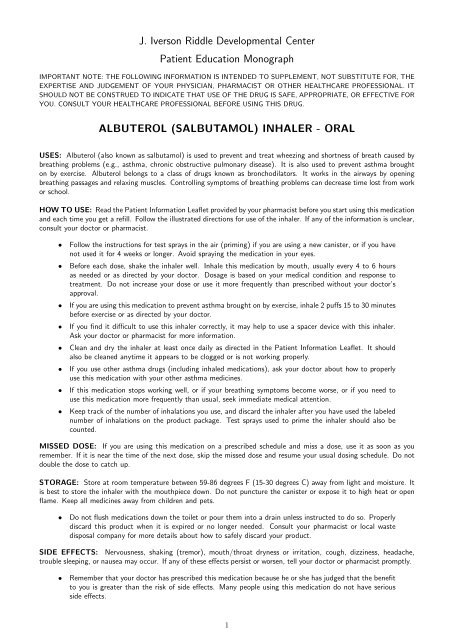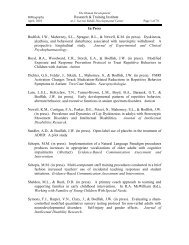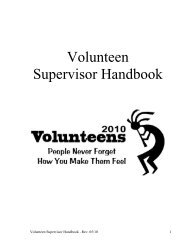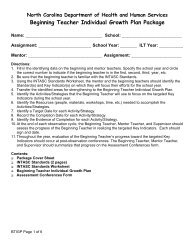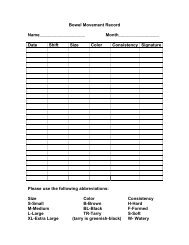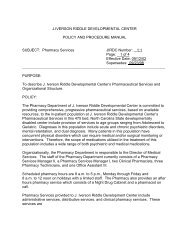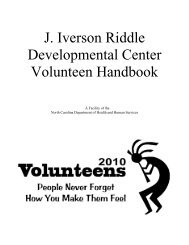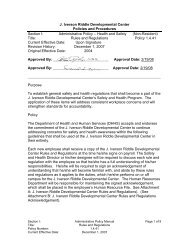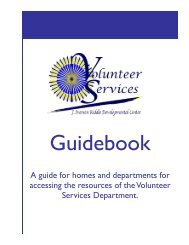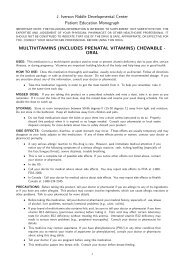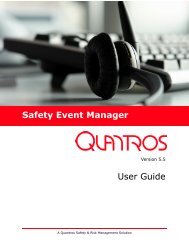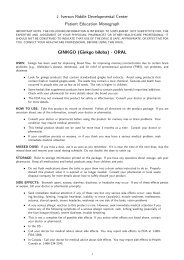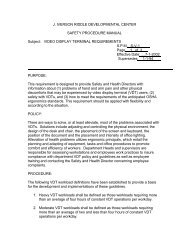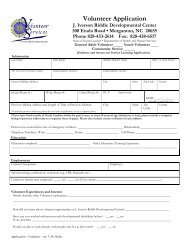(SALBUTAMOL) INHALER - ORAL
(SALBUTAMOL) INHALER - ORAL
(SALBUTAMOL) INHALER - ORAL
You also want an ePaper? Increase the reach of your titles
YUMPU automatically turns print PDFs into web optimized ePapers that Google loves.
J. Iverson Riddle Developmental Center<br />
Patient Education Monograph<br />
IMPORTANT NOTE: THE FOLLOWING INFORMATION IS INTENDED TO SUPPLEMENT, NOT SUBSTITUTE FOR, THE<br />
EXPERTISE AND JUDGEMENT OF YOUR PHYSICIAN, PHARMACIST OR OTHER HEALTHCARE PROFESSIONAL. IT<br />
SHOULD NOT BE CONSTRUED TO INDICATE THAT USE OF THE DRUG IS SAFE, APPROPRIATE, OR EFFECTIVE FOR<br />
YOU. CONSULT YOUR HEALTHCARE PROFESSIONAL BEFORE USING THIS DRUG.<br />
ALBUTEROL (<strong>SALBUTAMOL</strong>) <strong>INHALER</strong> - <strong>ORAL</strong><br />
USES: Albuterol (also known as salbutamol) is used to prevent and treat wheezing and shortness of breath caused by<br />
breathing problems (e.g., asthma, chronic obstructive pulmonary disease). It is also used to prevent asthma brought<br />
on by exercise. Albuterol belongs to a class of drugs known as bronchodilators. It works in the airways by opening<br />
breathing passages and relaxing muscles. Controlling symptoms of breathing problems can decrease time lost from work<br />
or school.<br />
HOW TO USE: Read the Patient Information Leaflet provided by your pharmacist before you start using this medication<br />
and each time you get a refill. Follow the illustrated directions for use of the inhaler. If any of the information is unclear,<br />
consult your doctor or pharmacist.<br />
• Follow the instructions for test sprays in the air (priming) if you are using a new canister, or if you have<br />
not used it for 4 weeks or longer. Avoid spraying the medication in your eyes.<br />
• Before each dose, shake the inhaler well. Inhale this medication by mouth, usually every 4 to 6 hours<br />
as needed or as directed by your doctor. Dosage is based on your medical condition and response to<br />
treatment. Do not increase your dose or use it more frequently than prescribed without your doctor’s<br />
approval.<br />
• If you are using this medication to prevent asthma brought on by exercise, inhale 2 puffs 15 to 30 minutes<br />
before exercise or as directed by your doctor.<br />
• If you find it difficult to use this inhaler correctly, it may help to use a spacer device with this inhaler.<br />
Ask your doctor or pharmacist for more information.<br />
• Clean and dry the inhaler at least once daily as directed in the Patient Information Leaflet. It should<br />
also be cleaned anytime it appears to be clogged or is not working properly.<br />
• If you use other asthma drugs (including inhaled medications), ask your doctor about how to properly<br />
use this medication with your other asthma medicines.<br />
• If this medication stops working well, or if your breathing symptoms become worse, or if you need to<br />
use this medication more frequently than usual, seek immediate medical attention.<br />
• Keep track of the number of inhalations you use, and discard the inhaler after you have used the labeled<br />
number of inhalations on the product package. Test sprays used to prime the inhaler should also be<br />
counted.<br />
MISSED DOSE: If you are using this medication on a prescribed schedule and miss a dose, use it as soon as you<br />
remember. If it is near the time of the next dose, skip the missed dose and resume your usual dosing schedule. Do not<br />
double the dose to catch up.<br />
STORAGE: Store at room temperature between 59-86 degrees F (15-30 degrees C) away from light and moisture. It<br />
is best to store the inhaler with the mouthpiece down. Do not puncture the canister or expose it to high heat or open<br />
flame. Keep all medicines away from children and pets.<br />
• Do not flush medications down the toilet or pour them into a drain unless instructed to do so. Properly<br />
discard this product when it is expired or no longer needed. Consult your pharmacist or local waste<br />
disposal company for more details about how to safely discard your product.<br />
SIDE EFFECTS: Nervousness, shaking (tremor), mouth/throat dryness or irritation, cough, dizziness, headache,<br />
trouble sleeping, or nausea may occur. If any of these effects persist or worsen, tell your doctor or pharmacist promptly.<br />
• Remember that your doctor has prescribed this medication because he or she has judged that the benefit<br />
to you is greater than the risk of side effects. Many people using this medication do not have serious<br />
side effects.<br />
1
• Tell your doctor immediately if any of these unlikely but serious side effects occur: fast/pounding<br />
heartbeat, muscle cramps/weakness.<br />
• Seek immediate medical attention if any of these rare but very serious side effects occur: chest pain,<br />
irregular heartbeat.<br />
• Rarely, this medication has caused severe (rarely fatal), sudden worsening of breathing problems/asthma<br />
(paradoxical bronchospasm). If you experience sudden wheezing, seek immediate medical attention.<br />
• A very serious allergic reaction to this drug is rare. However, seek immediate medical attention if you<br />
notice any symptoms of a serious allergic reaction, including: rash, itching/swelling (especially of the<br />
face/tongue/throat), severe dizziness, trouble breathing.<br />
• This is not a complete list of possible side effects. If you notice other effects not listed above, contact<br />
your doctor or pharmacist.<br />
• In the US -<br />
• Call your doctor for medical advice about side effects. You may report side effects to FDA at 1-800-<br />
FDA-1088.<br />
• In Canada - Call your doctor for medical advice about side effects. You may report side effects to Health<br />
Canada at 1-866-234-2345.<br />
PRECAUTIONS: Before using albuterol, tell your doctor or pharmacist if you are allergic to it; or if you have had a<br />
serious reaction to similar drugs (e.g., metaproterenol, terbutaline); or if you have any other allergies. This product may<br />
contain inactive ingredients, which can cause allergic reactions or other problems. Talk to your pharmacist for more<br />
details.<br />
• Before using this medication, tell your doctor or pharmacist your medical history, especially of: heart<br />
problems (e.g., irregular heartbeat, angina, heart attack), high blood pressure, diabetes, low levels of<br />
potassium in the blood, seizure, overactive thyroid (hyperthyroidism).<br />
• This drug may make you dizzy. Do not drive, use machinery, or do any activity that requires alertness<br />
until you are sure you can perform such activities safely. Limit alcoholic beverages.<br />
• Before having surgery, tell your doctor or dentist that you are using this medication.<br />
• Caution is advised when using this drug in older adults since they may be more sensitive to its effects,<br />
especially the effects on the heart.<br />
• During pregnancy, this medication should be used only when clearly needed. Discuss the risks and<br />
benefits with your doctor.<br />
• It is not known whether this drug passes into breast milk. Consult your doctor before breast-feeding.<br />
DRUG INTERACTIONS: Your doctor or pharmacist may already be aware of any possible drug interactions and may<br />
be monitoring you for them. Do not start, stop, or change the dosage of any medicine before checking with your doctor<br />
or pharmacist first.<br />
• Avoid taking MAO inhibitors (e.g., furazolidone, isocarboxazid, linezolid, moclobemide, phenelzine,<br />
procarbazine, rasagiline, selegiline, tranylcypromine) within 2 weeks before, during, or after treatment<br />
with this medication. In some cases a serious, possibly fatal drug interaction may occur.<br />
• Before using this medication, tell your doctor or pharmacist of all prescription and nonprescription/herbal<br />
products you may use, especially of: adrenaline-like drugs (e.g., ephedrine, epinephrine), some beta<br />
blockers (such as propranolol), digoxin, tricyclic antidepressants (e.g., amitriptyline, nortriptyline), ”water<br />
pills” (diuretics such as furosemide, hydrochlorothiazide).<br />
• Check the labels on all your medicines (e.g., cough-and-cold products, diet aids) because they may<br />
contain ingredients that could increase heart rate or blood pressure. Ask your pharmacist about using<br />
those products safely.<br />
• This document does not contain all possible interactions. Therefore, before using this product, tell your<br />
doctor or pharmacist of all the products you use. Keep a list of all your medications with you, and share<br />
the list with your doctor and pharmacist.<br />
NOTES: Do not share this medication with others.<br />
• Laboratory and/or medical tests (e.g., pulmonary function tests, blood pressure, levels of potassium in<br />
the blood) may be performed periodically to monitor your progress or check for side effects. Consult<br />
your doctor for more details.<br />
• Avoid allergens/irritants such as smoke, pollen, pet dander, dust, or molds that may worsen breathing<br />
problems.<br />
2
• Learn to use a peak flow meter, use it daily, and promptly report worsening breathing problems (such<br />
as readings in the yellow/red range, increased use of quick-relief inhalers).<br />
• Ask your doctor or pharmacist whether you should have an annual flu shot.<br />
OVERDOSE: If overdose is suspected, contact your local poison control center or emergency room immediately. US<br />
residents can call the US National Poison Hotline at 1-800-222-1222. Canada residents can call a provincial poison<br />
control center. Symptoms of overdose may include: fast/pounding/irregular heartbeat, severe shaking (tremors),<br />
seizures.<br />
3


